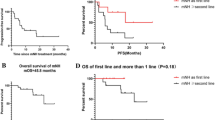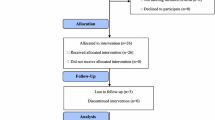Abstract
Purpose
We evaluated the efficacy and tolerability of oral vinorelbine plus trastuzumab (OV + T) in Her2 positive advanced breast cancer as first line chemotherapy or after progressing on earlier treatment.
Patients and methods
Thirty consecutive patients (median age: 59 years) were included. Patients received OV in a dose of 60 mg/m2 on day 1 and 8, q = 21, without dose escalation. Trastuzumab was administered every 3 weeks at a dose of 6 mg/kg bodyweight after a loading dose of 8 mg/kg. Response was evaluated every three cycles using UICC criteria. Time to progression (TTP) and overall survival (OS) were estimated using the Kaplan–Meier product limit method. A multivariate analysis was performed to evaluate factors potentially influencing response rate and TTP.
Results
Median time of observation was 20 months. We observed a complete response in 18% of patients, partial remission in 50%, stable disease ≥ 6 months in 21%, and progressive disease in 11%. TTP was median 9 months. OS was not reached. Response rate and TTP were influenced by line of treatment only. The main toxicities consisted of neutropenia and nausea.
Conclusions
OV + T appears to be an effective and safe treatment option in advanced breast cancer at the dose and schedule chosen.
Similar content being viewed by others
References
Ligibel JA, Winer EP (2002) Trastuzumab/chemotherapy combinations in metastatic breast cancer. Semin Oncol 29:38–43
Vogel CL, Franco SX (2003) Clinical experience with trastuzumab (herceptin). Breast J 9:452–462
Burstein HJ, Harris LN, Marcom PK et al (2003) Trastuzumab and Vinorelbine as first-line therapy forHer2-overexpressing metastatic breast cancer: multicenter phase II trial with clinical outcomes, analysis of serum tumor markers as predictive factors, and cardiac surveillance algorithm. J␣Clin Oncol 21:2889–2895
Slamon DJ, Clark GM, Wong SG et al (1987) Human breast cancer: correlation of relapse and survival with amplification of the HER2/neu oncogene. Science (Wash. DC) 235:177–182
Boss JS, Fletcher JA, Linette GP (2003) The HER-2/neu gene and protein in breast cancer 2003: biomarker and target of therapy. Oncologist 8:307–325
Paik S, Hazan R, Fisher ER et al (1990) Pathologic finding from the National Surgical Adjuvant Breast and Bowel Project: prognostic significance of erbB-2 protein expression in primary breast cancer. J Clin Oncol 8:103–112
Kallioniemi OP, Holli K, Visakorpi T et al (1991) Association of c-erbB-2 protein over-expression with high rate of cell proliferation, increased risk of visceral metastasis and poor long-term survival in breast cancer. Int J Cancer 4:650–655
Jahanzeb M, Mortimer JE, Yunus F et al (2002) Phase II trial of weekly Vinorelbine and Trastuzumab as first-line therapy in patients with Her2(+) metastatic breast cancer. Oncologist 7:410–417
Slamon DJ, Leyland-Jones B, Shak S et al (2001) Use of chemotherapy plus a monoclonal antibody against HER2 for metastatic breast cancer that overexpresses HER2. N Engl J Med 344:783–792
Jahanzeb M (2003) Trastuzumab-BAsed combinations in metastatic breast cancer: how to make a choice. Clinical Breast Cancer 1:28–38
Suzuki Y, Tokuda Y, Saito Y et al (2003) Combination of trastuzumab and vinorelbine in metastatic breast cancer. Jpn J Clin Oncol 33:514–517
Burstein HJ, Kuter I, Campos SM et al (2004) Clinical activity of trastuzumab and vinorelbine in women with Her2-overexpressing breast cancer. J Clin Oncol 19:2722–2730
Potier P (1989) The synthesis of navelbine prototype of a new series of vinblastine derivatives. Semin Oncol 16(Suppl 4):2
Smith GA (1995) Current status of vinorelbine for breast cancer. Oncol (Huntingt) 9:767–773
Rossi A, Gridelli C, Gebbia V et al (2003) Single agent vinorelbine as first-line chemotherapy in elderly patients with advanced breast cancer. Anticancer Res 23:1657–1664
Depierre A, Freyer G, Jassem J et al (2001) Oral vinorelbine: feasibility and safety profile. Ann Oncol 12:1677–1681
Marty M, Fumoleau P, Adenis A et al (2001) Oral vinorelbine pharmacokinetics and absolute bioavailability in patients with solid tumours. Ann Oncol 12:1643–1649
Variol P, Nguyen L, Tranchand B, Puozzo C (2002). A simultaneous oral/intravenous population pharmacokinetic model for vinorelbine. Eur J Clin Pharmacol 58:467–476
Bonneterre J, Chevalier B, Focan C et al (2001) Phase I and pharmacokinetic study of weekly oral therapy with vinorelbine in patients with advanced breast cancer (ABC). Ann Oncol 12:1683–1691
Bartsch R, Wenzel C, Pluschnig U et al (2006) Oral vinorelbine alone or in combination with trastuzumab in advanced breast cancer: results from a pilot trial. Cancer Chemother Pharmacol 54:554–558
Liu G, Franssen E, Fitch MI, Warner E (1997) Patient preferences for oral versus intravenous palliative chemotherapy. J Clin Oncol 15:110–115
Leyland-Jones B, Gelmon K, Ayoub JP et al (2003) Pharmacokinetics, safety, and efficacy of trastuzumab administered every three weeks in combination with paclitaxel. J Clin Oncol 21:3965–3971
Kaplan EL, Meier P (1958) Non parametric estimation for incomplete observations. J Am Stat Ass 53:457–481
Carlson RW (1998) Quality of life issues in the treatment of metastatic breast cancer. Oncology (Huntingt) 12:27–31
Freyer G, Delozier T, Lichinister M et al (2003) Phase II study of oral vinorelbine in first-line advanced breast cancer chemotherapy. J Clin Oncol 21:35–40
Trillet-Lenoir V, Sommer H, Delozier T et al (2004) Oral vinorelbine in metastatic breast cancer: long term results of 2 phase II studies. Eur J Can 2 Suppl 3:137
Mano M (2006) Vinorelbine in the management of breast cancer: new perspectives revived role in the era of targeted therapy. Cancer Treatment Rev 32:106–118
Fazeny B, Zifko U, Meryn S et al (1996) Vinorelbine-induced neurotoxicity in patients with advanced breast cancer pretreated with paclitaxel – a phase II study. Cancer Chemother Pharmacol 39:150–156
Zelek L, Barthier S, Riofrio M et al (2001) Weekly vinorelbine is an effective palliative regimen after the failure with anthracyclines and taxanes in metastatic breast carcinoma. Cancer 92:2267–2272
Author information
Authors and Affiliations
Corresponding author
Rights and permissions
About this article
Cite this article
Bartsch, R., Wenzel, C., Altorjai, G. et al. Results from an observational trial with oral vinorelbine and trastuzumab in advanced breast cancer. Breast Cancer Res Treat 102, 375–381 (2007). https://doi.org/10.1007/s10549-006-9342-5
Received:
Accepted:
Published:
Issue Date:
DOI: https://doi.org/10.1007/s10549-006-9342-5




